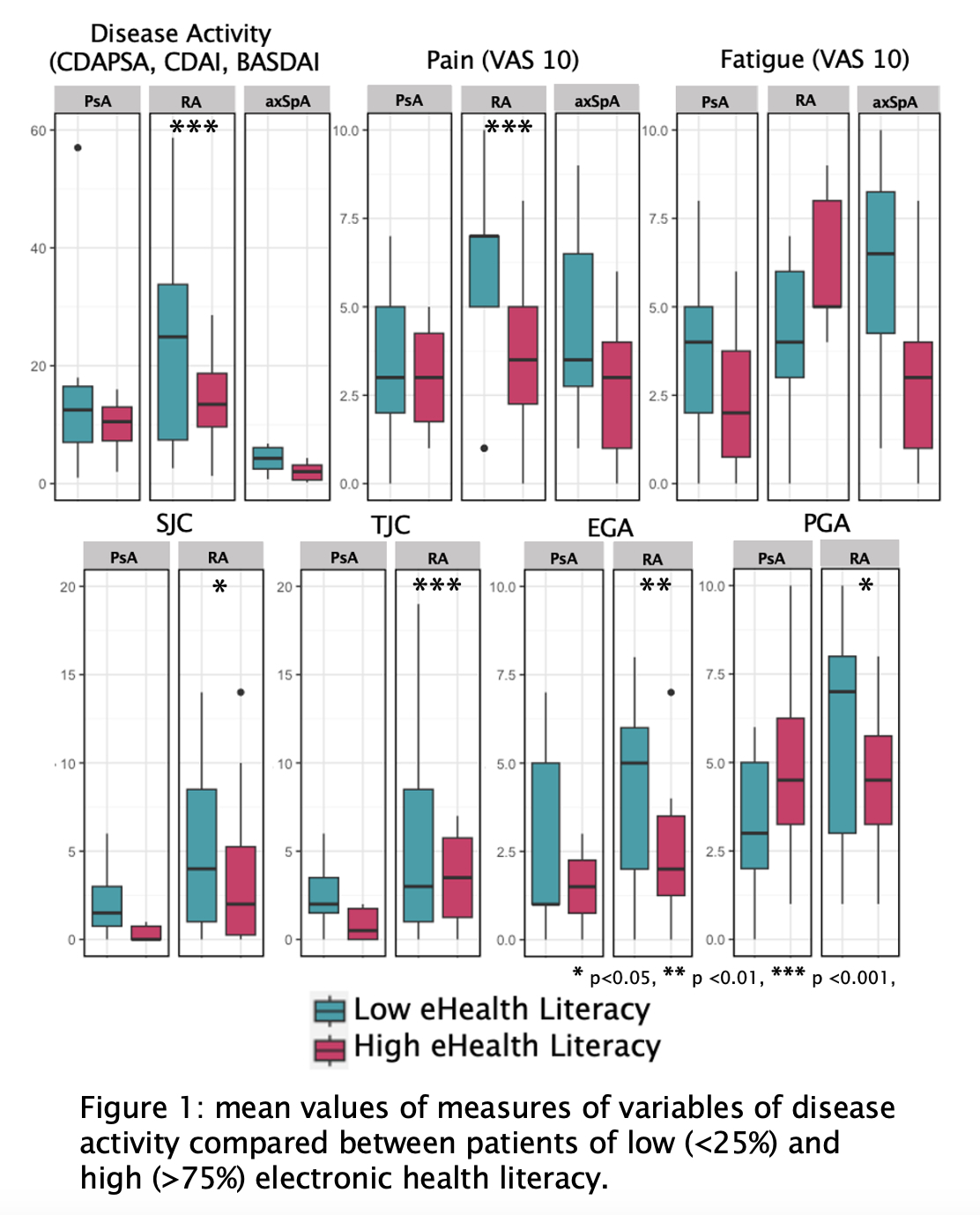Session Information
Session Type: Poster Session C
Session Time: 10:30AM-12:30PM
Background/Purpose: In the evolving landscape of healthcare, the reliance on digital tools for patient education and management is growing. The effectiveness of these digital resources largely depends on the electronic health literacy (eHL) of patients, defined as the ability to search, understand, and use health information from electronic sources. Despite the increasing reliance on these tools, comprehensive data on eHL among patients with Rheumatic and Musculoskeletal Diseases (RMDs) is lacking. This study aims to measure eHL in RMD patients and explore its potential differences by patient factors.
Methods: All adult (≥18yrs) patients with RMDs visiting the outpatient rheumatology department at the Medical University of Vienna from June 2023 onwards were asked to complete the German revised electronic health literacy scale (Gr-eHeals), an 8-item questionnaire that assesses eHL on a scale from 1 (lowest) to 5 (highest) in 2 domains: seeking and appraisal. Data on sex, age, and diagnosis were collected and compared for differences in eHL. For patients with inflammatory arthritis (Rheumatoid Arthritis, Psoriatic Arthritis, and Axial Spondyloarthritis), data on disease activity and PROs derived from patient registries were compared across lowest (< 25%) and highest ( >75%) quartile of eHL using T-Test.
Results: From 802 returned Gr-eHeals questionnaires, 551 (mean age 53.1±16.4 years, 71.6% female, mean overall Gr-eHeals score 3.6±1.1) were analyzed. Due to the high correlation (r=0.85) between the seeking and appraisal domain, the overal mean of the Gr-eHeals was used. Decreasing eHL scores were associated with increasing age, but no significant differences were observed across sex or specific diseases. In patients with RA higher eHL was overall associated with lower levels of disease activity as assessed by clinical disease activity index (CDAI), physician-derived measures of disease activity (Swollen Joint Count [SJC], Tender Joint Count [TJC], and Evaluator Global Assessment [EGA]) as well as patient reported outcomes (pain, fatigue and PGA). Although not statistically significant, similar trend was found for AxSpA and PsA (Figure 1).
Conclusion: This study represents one of the largest to characterize eHL in RMD patients. Findings suggest that higher eHL is associated with lower disease activity in certain RMD conditions, highlighting the need for targeted interventions to enhance eHL and potentially improve clinical outcomes in this population.
To cite this abstract in AMA style:
Nakhost Lotfi N, Lechner-Radner H, Sieghart D, Studenic P. Electronic Health Literacy and Its Association with Disease Activity in RMD Patients – a Cross Sectional Study [abstract]. Arthritis Rheumatol. 2024; 76 (suppl 9). https://acrabstracts.org/abstract/electronic-health-literacy-and-its-association-with-disease-activity-in-rmd-patients-a-cross-sectional-study/. Accessed .« Back to ACR Convergence 2024
ACR Meeting Abstracts - https://acrabstracts.org/abstract/electronic-health-literacy-and-its-association-with-disease-activity-in-rmd-patients-a-cross-sectional-study/

